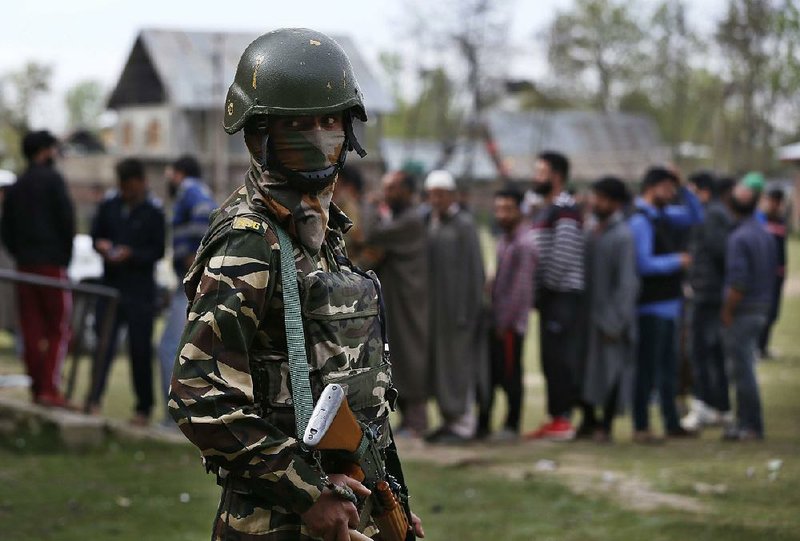NEW DELHI -- At least four people were killed in clashes Thursday on the first day of polling in India's general elections, a six-week process that's seen as a referendum on Prime Minister Narendra Modi and his Hindu nationalist Bharatiya Janata Party, officials said Thursday.
Police said two workers of Andhra Pradesh state's ruling Telugu Desam party were killed in a confrontation with supporters of a regional opposition party, YSR Congress. One election official was killed in an attack by suspected insurgents in India's remote northeast, the Election Commission said.
Violent clashes were also reported elsewhere in Andhra Pradesh state, where voters are casting ballots for 25 members of India's lower house of Parliament, the Lok Sabha, and 175 state assembly seats. Another person was killed by government forces during a protest in disputed Kashmir.
Outside Andhra Pradesh, voting was taking place Thursday in 17 other Indian states and two Union Territories in the first of a seven-phase election staged over six weeks. Turnout was estimated at more than 60 percent of voters.
At least 15 electronic voting machines were damaged by some angry voters during the voting in several states, Chandra Bhushan, an election commission official, told reporters.
With 900 million of India's 1.3 billion people registered to vote, it is the world's largest democratic exercise. Over the course of the election, 543 Lok Sahba seats will be decided from about a million polling stations across India.
With Modi as their frontman, the Bharatiya Janata Party won a clear majority in 2014 elections. Under the leadership of political dynasty scion Rahul Gandhi, India's National Congress party, which ruled the country for more than half a century since the 1947 independence, has struggled to coalesce India's many opposition parties into a coherent effort that could go head-to-head with the Bharatiya Janata Party.
Supporters of Modi say the tea seller's son from Gujarat state has improved the nation's standing in the world. India's economy has continued to grow under Modi, jostling with the United Kingdom for the fifth-largest in the world.
"I vote for the progress of my country," said businessman Manish Kumar after casting his ballot for the Bharatiya Janata Party in the Ghaziabad district of Uttar Pradesh state.
Tapan Shome, an accountant, said he and his wife voted "to make India a good, prosperous country."
But India's growth hasn't meant a better employment outlook in the country, where an estimated 1 million people join the labor pool each month. According to the Center for Monitoring the Indian Economy, employment contracted by 3.5 million jobs in the year after a 2016 demonetization program to remove most of India's banknotes from circulation.
And Modi's critics say his party's Hindu nationalism has aggravated religious tensions and violence against Muslims and other minority groups in constitutionally secular India.
Since a suicide bombing in disputed Kashmir killed 40 Indian paramilitary forces in February, the Bharatiya Janata campaign has played up the threat of Muslim-majority Pakistan.
Voting also began Thursday for two parliamentary seats in Kashmir, a Himalayan region split between India and Pakistan and claimed by both in its entirety. The vote came under tight security and as calls arose for a boycott by Muslim separatists who say the polls are an illegitimate exercise. Armed police and paramilitary soldiers in riot gear guarded polling stations and nearby roads.
After the polls closed, violence broke out. Government forces fired at anti-India protesters, killing a teenage boy and wounding at least five others in northwestern Handwara area, police and medics said.
The protesters were chanting slogans demanding an end to Indian rule over the region and throwing stones at troops, who fired bullets.
Anti-India protests and clashes were also reported from northern Palhalan area as well.
In Kashmir's northern Baramulla area, voter turnout was estimated at around 35 percent compared to 38 percent in 2014. Many people said they came out to vote only to express their disapproval of the Bharatiya Janata Party, calling it an "anti-Muslim" and "anti-Kashmiri" organization.
The party's election manifesto promised to scrap decades-old special rights for Kashmiris under India's constitution that prevent outsiders from buying property in the territory.
"I didn't want to vote but then there's an imminent threat by politicians like Modi who are up in arms against Kashmiris," said Abdul Qayoom, a voter in Baramulla town. "They've taken our rights; now they want to dispossess us from our land. We want to stop people like Modi."
Information for this article was contributed by Omer Farooq, Aijaz Hussain and Shonal Ganguly of The Associated Press.
A Section on 04/12/2019
